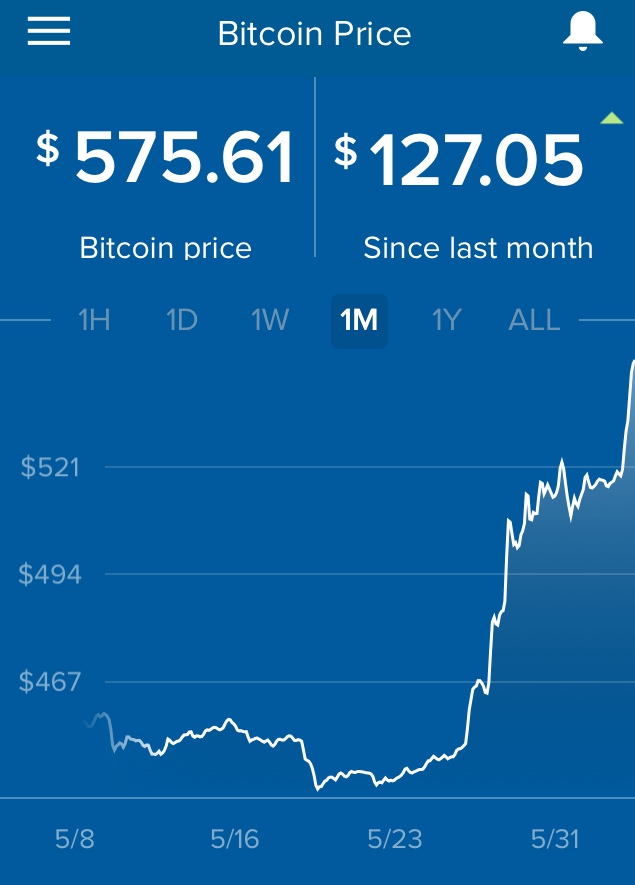
A bitcoin price prediction? I’m not going to offer a specific number, because 99.99999 percent of the folks who have tried to do that have been wrong.
But in the wake of another recent surge in the price of the digital currency, I will offer some thoughts on why it is occurring and how long it is likely to continue.
For people with absolutely no idea what bitcoin is, I recommend my Bitcoin Apprentice Course video series or the book on bitcoin that I co-authored.
Bitcoin is a digital currency that has gained traction largely because it has created a way to allow people to send payments to each another online without any banks, governments or payment processors interceding. It largely eliminates the dangers that using credit or debit cards pose — such as having your card number stolen. There is no central computer or database where all of the information resides. Instead, it is on a network of millions of computers around the world.
These and other attributes have given the digital currency current and future value in the eyes of investors, who are the primary drivers of its value, which is in the $570 per bitcoin range as of this writing. The value has jumped nearly 20 percent in the past 10 days due in large part to Chinese investors looking for a place to invest in the wake of the devaluation of their own currency. In fact, about 90 percent of bitcoin purchases (trades) take place in China, despite the fact bitcoin is not an official currency of that country.
Here are some of the reasons I bought in beginning two years ago, and why I believe the value will continue to rise over time:
- Scarcity: The creator of the bitcoin software set it up so that only 21 million bitcoins will ever be created. As I write this post, about 15.6 million have been created. So there are only about 5.4 million more left in supply. As the price continues to increase over time as I believe it will, the perception of lower supply will provoke higher demand.
- Mainstreaming: At least one of the existing cryptocurrencies will become mainstream to some extent. PayPal has recently filed a patent for technology that will allow it to accept payment via bitcoin, and for people to pay using bitcoin. As this process develops, other payment processing companies will also follow suit. All of this will increase demand in bitcoin. Also, nearly half the world’s population does not have access to banks. But many of those folks have a mobile phone. Check out this 60 Minutes story about how digital currency has taken off in Kenya. All it’s going to take is some entrepreneur to figure out how to make bitcoin exchange that easy and secure, and there will be no looking back.
- Eight decimal places: The smallest fraction of a bitcoin is 0.00000001. That is currently equivalent to about a half a millionth of a cent in U.S. dollars. So why is that important? If a significant percentage of the world’s commerce gains some value in bitcoin, its value will rise to such a level that even the eighth decimal place will have a measurable value. For the sake of example, let’s say if you want to buy something for a penny, you would have to digitally transfer 0.00000001 bitcoin. That would mean that the overall value of one bitcoin would have to be $10 million. That would occur completely due to the market, and what it would bear. But if 21 million whole bitcoin units are to be the limit of a robust world digital economy, then very small fractions of a whole bitcoin will be necessary to pay for small items.
- First to market advantage: As Apple got the first-to-market advantage with smartphones, bitcoin is likely to experience the same with digital currency. Of all of the hundreds of digital currencies now available, bitcoin is probably the only name you would recognize. Whatever market exists for widespread direct digital currency transfers is likely to be filled first by bitcoin, much like Microsoft in computer operating systems, and Google in search engines.
I’m not smart enough to tell you how, exactly when, or even if any of this will actually happen. But the factors listed above have a solid basis in free market economics. Bitcoin is not a company. It is a software invented by an individual whose identity is not clear, even though an Australian computer scientist recently stepped forward and claimed he is the mysterious inventor. Bitcoin is not owned by a corporation, and is not controlled by a government, so those influences will have a lesser impact than you might expect.
If you’re interested in dipping your toe into the bitcoin pool, the best and most secure place to buy, sell and store it is Coinbase.com. I started years ago buying $10 worth. After a year of investing $100 monthly, my investment has more than doubled in value. If this is at all intriguing to you, I’d recommend opening an account at Coinbase.com, buying a small amount and watching as it grows over time. I can’t predict or guarantee you a profit, but I am holding right now as a long-term investment with an eye toward those eight decimal places.